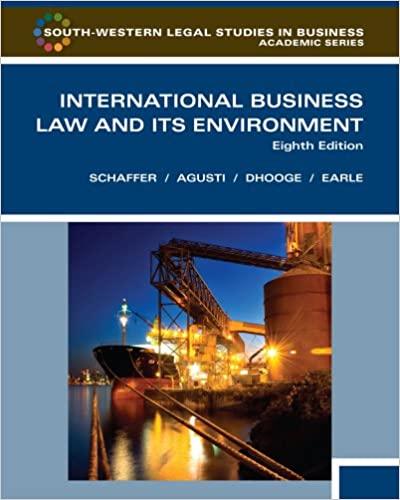Question
You are an administrative officer in a criminal justice agency, and a citizen calls you up to complain that one of your officers destroyed evidence
You are an administrative officer in a criminal justice agency, and a citizen calls you up to complain that one of your officers destroyed evidence instead of collecting it and impounding it into the evidence room. The agency has a policy that all evidence is to be impounded (seized) and transported to the evidence room. Additionally, state law prohibits the destruction of evidence.
Scenario:
A coffee shop manager found a baggie of marijuana and a vial of hash oil that was left in the public restroom. The manager called your agency, and an officer was dispatched to the shop. The officer interviewed the manager and then explained to him that it was impossible to determine who the owner of the drugs was and that no charges could ever be pressed. Subsequently, the officer suggested that it would be best to flush the marijuana down the toilet and drain the hash oil down the sink. The manager agreed to the officer's terms, and the officer instructed the manager to destroy the evidence. The manager destroyed the evidence in the presence of the officer.
Interview:
You summon the officer into your office and ask him what happened. The officer explained that the manager agreed to destroy the evidence and that the officer made sure that he never personally touched it or destroyed it. The officer said that it would have been a waste of time to inventory the drugs, do all of the paperwork, and transport the drugs to the evidence room downtown.
- Should an administrative investigation be conducted to determine if the officer violated any agency policies or state laws? Why or why not?
- If the owner of the drugs is unknown and if no charges can be pressed for possession of drugs, is it genuine destruction of evidence case?
- Was the officer ethically or legally obligated to impound the drugs, or was officer discretion more appropriate to determine if the drugs should be destroyed on the spot?
- If identified drugs are not fully accounted for by officers by inventorying them and then impounding them, then is it possible for the drugs to be illegally used or resold on the black market?
- Why do agencies have policies for impounding evidence?
- What does the public expect in a case like this?
Step by Step Solution
There are 3 Steps involved in it
Step: 1

Get Instant Access to Expert-Tailored Solutions
See step-by-step solutions with expert insights and AI powered tools for academic success
Step: 2

Step: 3

Ace Your Homework with AI
Get the answers you need in no time with our AI-driven, step-by-step assistance
Get Started


